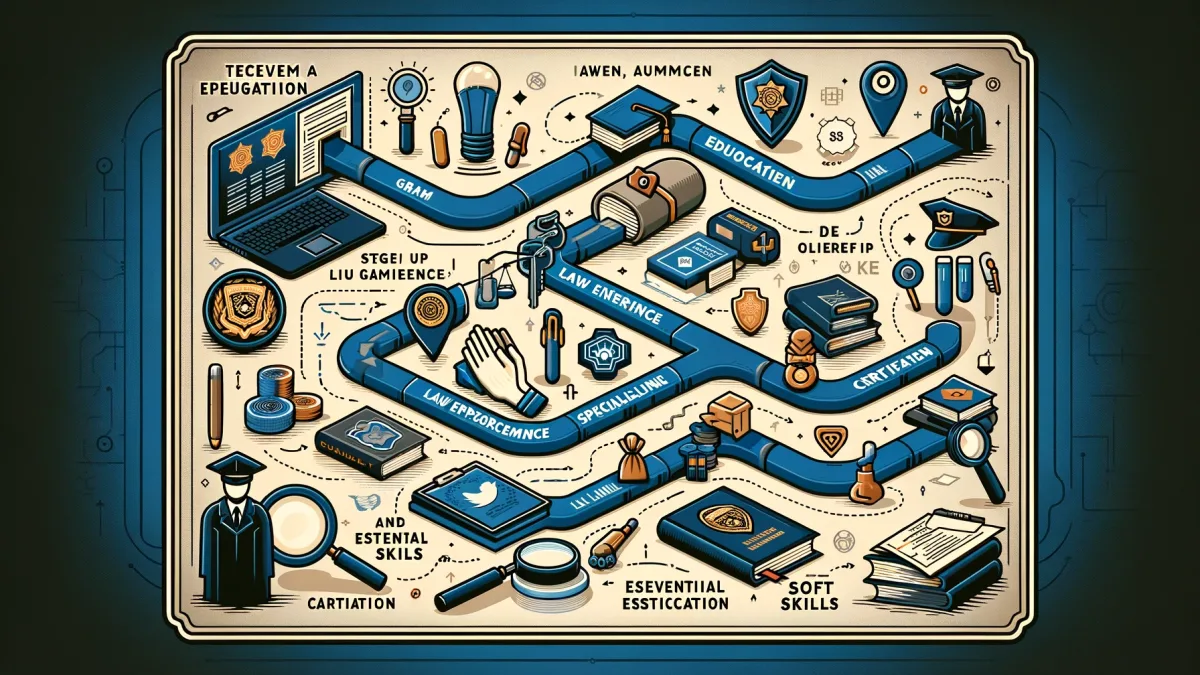Ever watched a crime drama and thought, “Hey, I could do that”? If the idea of solving mysteries, digging through evidence, and bringing justice to light excites you, then a career as a criminal investigator might just be your calling. But how does one transition from armchair detective to bona fide investigator? Let’s unravel the mystery together.
Who is Criminal Investigator?
A Criminal Investigator is a professional who is part of law enforcement and is tasked with the job of solving crimes. They gather facts and collect evidence to determine who committed the crime and how it was done. Their work involves examining crime scenes, interviewing witnesses and suspects, conducting surveillance, collecting physical evidence, and analyzing information to piece together a case. Criminal Investigators may work for local, state, or federal agencies, such as police departments, the Federal Bureau of Investigation (FBI), or the Department of Homeland Security.
Their role is critical in the criminal justice system, as they provide the necessary evidence and information to prosecutors to help bring criminals to justice. This profession requires a strong understanding of the law, keen observational skills, analytical thinking, and the ability to communicate effectively. Investigators often specialize in particular types of crimes, such as homicide, fraud, cybercrime, or narcotics.
The work of a Criminal Investigator can be both challenging and rewarding, offering the opportunity to solve complex puzzles, help victims of crime, and make communities safer. It demands a high level of dedication, ethical standards, and sometimes the ability to handle stressful and potentially dangerous situations.
How to Become a Criminal Investigator?(step-by-step)
Step 1: Understanding the Role
First off, let’s clarify what a criminal investigator does. Unlike their TV counterparts, real criminal investigators spend a lot of time on tasks that might not make the final cut in a crime drama. This includes reviewing records, conducting interviews, and, yes, a fair amount of paperwork. They work closely with law enforcement to solve crimes, gathering and analyzing evidence to build cases.
Step 2: Educational Foundations
While you don’t need a magnifying glass or a deerstalker hat, you do need a solid educational foundation. A high school diploma is essential, but pursuing further education can significantly boost your prospects.
A. Bachelor’s Degree
A bachelor’s degree in criminal justice, forensic science, or a related field is highly recommended. These programs cover the criminal justice system, investigative techniques, and often include practical experiences like internships.
B. Specialized Training
Many agencies provide specialized training for their investigators. The Federal Bureau of Investigation (FBI), for instance, runs the National Academy to train law enforcement officers in various aspects of criminal investigation.
Step 3: Gain Experience
Experience is crucial in the field of criminal investigation. Starting your career in law enforcement or a related field can provide valuable on-the-job training.
A. Law Enforcement Background
Many criminal investigators start as police officers or sheriffs. This experience is invaluable, offering insights into the legal system, investigative procedures, and evidence collection.
B. Military Experience
A background in the military, especially in military police or investigative roles, can also be advantageous. It demonstrates discipline, a strong work ethic, and familiarity with investigative procedures.
Step 4: Certification and Specialization
Certification can enhance your credentials and may be required for certain positions. Organizations like the American Board of Criminalistics offer certifications for various forensic specialties. Additionally, consider specializing in areas like cybercrime, homicide, or fraud to stand out.
Step 5: Soft Skills Matter
The best criminal investigators possess a unique set of soft skills:
- Analytical Thinking: The ability to piece together seemingly unrelated pieces of information is key.
- Attention to Detail: Small details can make or break a case.
- Communication: You’ll need to interview witnesses, interrogate suspects, and present findings clearly.
- Ethics and Integrity: The foundation of trust in any criminal justice role.
Step 6: Continuous Learning
Laws change. Technologies evolve. Criminals get craftier. Staying ahead means committing to lifelong learning, whether through formal education, workshops, or self-study.
Navigating the Career Path
Now that we’ve laid out the steps, let’s talk about navigating this career path. Networking with professionals in the field, attending criminal justice conferences, and joining relevant organizations can provide valuable connections and learning opportunities.
Overcoming Challenges
It’s not all catching bad guys and high-speed chases. The job can be emotionally taxing, dealing with the darker aspects of human behavior. It requires resilience, a support system, and sometimes, professional help to manage the stress and emotional toll.
Conclusion: Is It Worth It?
Becoming a criminal investigator is a journey of dedication, education, and continuous growth. It’s a path for those passionate about justice, with a keen eye for detail and a strong moral compass. If you’re ready to embrace the challenge, the field of criminal investigation offers a rewarding career making a real difference in your community and beyond.
Remember, the journey to becoming a criminal investigator is as much about personal growth as it is about professional development. Stay curious, stay ethical, and never stop learning. The next chapter of your career could be the most exciting one yet.









Leave a Reply